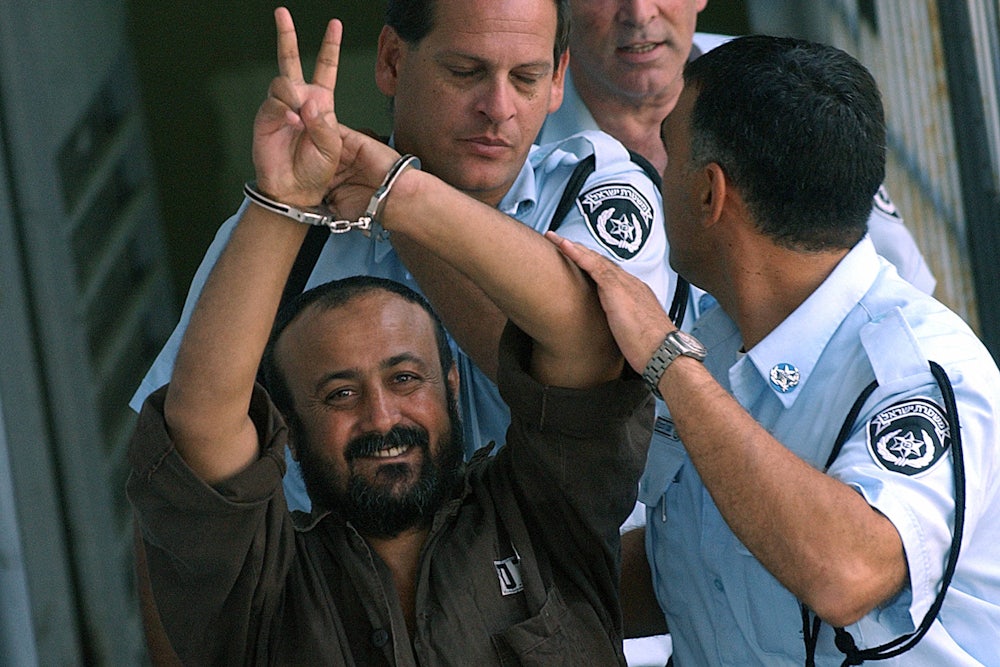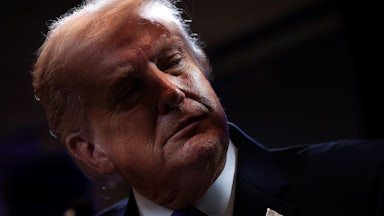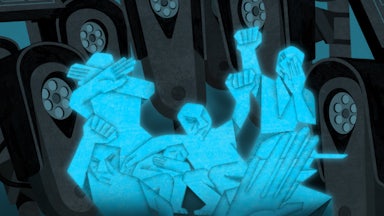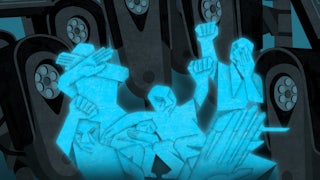Marwan Barghouti is Israel’s most celebrated prisoner and, by all accounts, the person most likely to succeed Palestinian Authority president and PLO leader Mahmoud Abbas whenever the Palestinian Authority—and the PLO—holds elections. Since 2002, he has been serving five life sentences plus an add-on of 40 years for his role in the Second Intifada. Barghouti was convicted of the direct murder of five Israeli citizens and for planning additional murders as the head of the Tanzim, the military wing of the nationalist Fatah party (also Abbas’s party), during the 1990s Second Intifada. Since then, he has renounced violence. In 2012, for example, in his court hearing, he spoke in Arabic, telling the Palestinian people to fight for “peaceful popular resistance of the occupation.”
There is faint hope that he could be released soon, as part of a deal with Hamas for the Israeli hostages. More likely, he will be released by a post-Netanyahu government if there is any hope for a two-state solution to the Israel-Palestinian crisis. There is simply no other leader who can deliver this scenario. Indeed, his prisoner status gives him extraordinary gravitas among the Palestinian people. He is also seen as not corrupt, unlike the current leadership of Abbas and those around him.
Once he is released, it will be difficult for an Israeli government to defy momentum toward a two-state option. In a recent Haaretz interview, Ami Ayalon, a former head of Israel’s Shin Bet security services, stressed not only that it was in Israel’s security interest to agree to a Palestinian state but that Barghouti must be released to negotiate and lead this state. “Marwan is the only Palestinian leader who can be elected and lead a united and legitimate Palestinian leadership toward a path of mutually agreed separation from Israel,” he told the Israeli newspaper.
Every poll since his imprisonment shows Barghouti to be the favorite to lead the Palestinian people in a free election. The most recent survey by Ramallah-based pollster Khalil Shikaki shows the same. When I met with Shikaki in January, in his Ramallah office, he told me: “Barghouti remains the most popular by far. We have never seen Barghouti losing, even during wartime, when Hamas gains ground.” No other Fatah leader can claim the same.
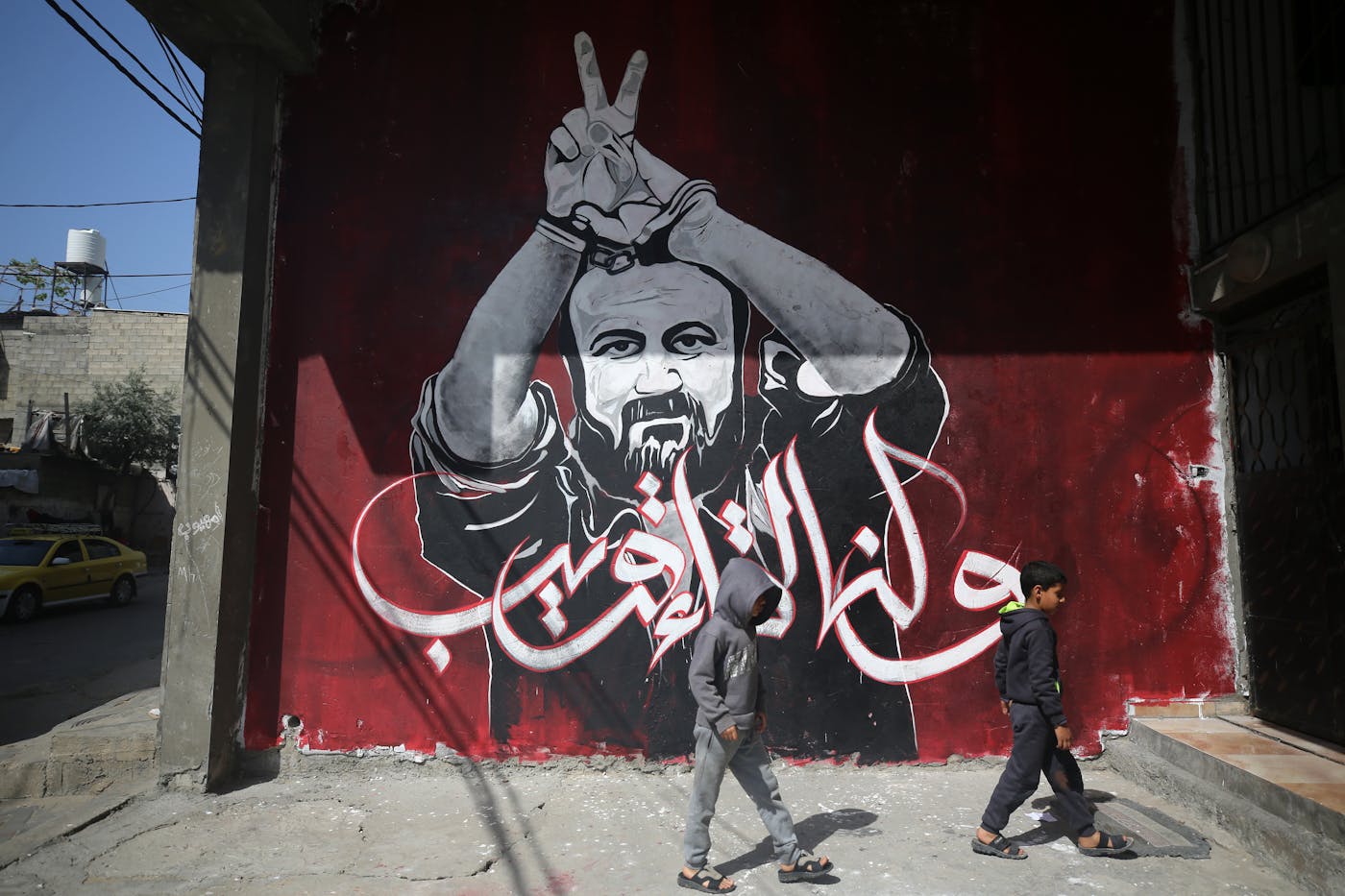
Journalists are not permitted to interview Barghouti in prison. His wife, Fadwa Barghouti, herself a noted Fatah leader, women’s activist, and lawyer, hasn’t seen him in 18 months. Once heading a thriving legal practice, since her husband’s imprisonment she is active full-time keeping him in the public eye and advocating globally for his release. Barghouti’s closest political ally is Qadora Fares, who spent 13 years in Israeli prisons for his activities during the Intifada. The current commissioner of the Palestinian Commission of Detainees and Ex-Detainees Affairs for the Palestinian Authority, he oversees family needs and rehabilitation of prisoners kept in Israeli jails and is himself a popular political leader with the grassroots. Once called “the Fatah Young Guard,” he and Barghouti are now in their late fifties. Fares is a veteran of earlier peace initiatives, and today he still stands by all of them. So does Barghouti, Fares told me when I visited him at his office in Ramallah.
One of the most important documents never to be implemented was a 2006 “Prisoners’ Letter” co-authored by Barghouti on behalf of Fatah, Hamas, and other Palestinian factions inside the Israeli prisons, which offered an outline for a two-state solution. At the time, it made headlines precisely because Barghouti was able to negotiate it with the Hamas and more radical factions in prison. While it clearly articulates two states, it is likely more sweeping in other details than anything the Israeli government could accept, but the two-state declaration in it is clear. When I asked Fares if it is still relevant, he said, emphatically, “Yes, yes, yes.”
An earlier document, the Geneva Initiative of 2003, negotiated by former Israeli Justice Minister Yossi Beilin and former Palestinian Authority Minister Yassar Abed Rabo, also outlines a two-state solution roughly along the 1967 lines, with a refugee-return formula that is more likely to be accepted by an Israeli government than the prisoners’ document. It has been used by Israel’s shrunken peace camp as an aspirational model for years.
Fares, who signed Geneva at the time, told me that if Barghouti had objected to his signing, he would not have done so. Fares thinks that “Geneva, if you have a serious partner in Israel, will be accepted by the Palestinian majority, including Hamas.”
This initiative makes the parameters of an agreement clear, according to Fares, with “solutions—Jerusalem, refugees, borders, economic cooperation, everything. Some people criticize us because of the exchange of border swaps.” The compromise is to split Palestine. “All this land is Palestine,” he told me. “But when we signed the agreement, it became Palestine and Israel, OK? If you accept the principle of splitting it, OK ... if we want to check which kind of solution I find there, if tomorrow I became the representative of Palestinians, I will sign this.”
Today, there is a completely different opportunity than existed 20 or so years ago: to include all of the Arab states, most importantly Saudi Arabia, in an agreement sponsored by the kingdom and called the Arab Peace Initiative, which offers Israel full peace from regional governments with a Palestinian state. Though it was originally promoted by the Saudis in 2002, Benjamin Netanyahu’s government ignored it, and until recently Netanyahu (lured into a sort of unreality regarding the Palestinians thanks to the Trump strategy regarding the Abraham Accords, which gave Israel agreements with several Gulf States minus Palestinian recognition) thought that Israel could amend the agreement for peace with Saudi minus a Palestinian state. (As recently as at the 2023 U.N. General Assembly plenum, Netanyahu held up a map that included all of Israel’s neighbors minus a future Palestine.) That was highly unlikely, to say the least, but October 7 shattered it completely.
According to Fares, who also agrees with this Saudi initiative, “it’s been accepted by Marwan.” But for Israel to engage, there will have to be a new government. He adds: “First of all, the Israelis have to say that they decide to end the occupation, and they want to cooperate with the Arab world, with the Palestinian people. If there is an international effort, a real serious effort to react to a serious political process that will lead to end the occupation and to build our own state, I think that the behavior of Hamas, the policies of Hamas, the decision will be different.” That’s because “the Hamas political leadership understands that the Palestinian-Israeli conflict has to find a solution one day.” One hopes that Fares’s optimism could be warranted, though it’s difficult to imagine a shaken and frightened Israeli public buying it. Regardless, a political resolution promoting two viable states, with a strong Palestinian leader—with the overt support of the leading Arab states—could someday be a positive outcome of the Hamas attacks on October 7.
That’s also why Fares’s comments about a demilitarized Palestine were of vital importance. This is something that all Israeli political factions (and the United States) demand—and, though it’s unstated, the Arab states will also probably demand it. “If I am at peace with Israel, with Jordan, with Egypt, with the international community, and I need the support of the international community to rebuild our state … to act according to the Palestinian people’s interest, I have to think about an army?” he quips. “I have to create in Palestine what is most necessary … we have to build hospitals, schools, universities—to rehabilitate everything. We have around us here in the region a lot of strong armies. What have they done? Nothing. So it should be invested in education.… Let me imagine that I am a dominant person in the Palestinian leadership. And we are an independent state. Let us prepare the plan for the first five years.… For what do I need the army?”
So, returning to the awful moment in which we still find ourselves, why, I ask, did Hamas attack on October 7? Fares surmises that “it was because Netanyahu was telling Israel and the world that there is no Palestinian issue. That there could be a ‘new Middle East’ without finding a solution.” He continued: “The Palestinian Authority in Ramallah is a weak one … Netanyahu wants to bring it in as part of his administration indirectly.” As has been widely documented, Netanyahu thought he could stave off an independent Palestinian state by, as Fares characterized it, “taming Hamas.” It’s common knowledge now that Netanyahu had been allowing funding from Qatar to Hamas’s military and governing arm in Gaza for years—as a means of defanging Fatah.
Meanwhile, at the war’s start, Barghouti was moved to Ayalon Prison and placed in solitary confinement for five days. The Israeli authorities claimed that Barghouti wrote a letter supporting October 7. He and his wife deny this vehemently, as does Fares. This was used as an excuse to isolate him, where “his cell was dark 24 hours daily,” Fares said. Barghouti has been given minimal food, his mattress taken away during the day, and sleep deprived by blasting music. “They tried to humiliate him when they tied his hands to his back. They want his head to be close to the ground,” Fares explained. Partly due to the family hiring one of Israel’s leading human and civil rights attorneys, he is now back in Rimonim Prison in the center of Israel.
According to Fares and others quite close to Barghouti with whom I met, Marwan’s resolve remains. “He’s a true, true believer in the two-state solution,” someone very close to the family stressed to me during my recent Ramallah visit. Barghouti has become a bit of a legend among both the Palestinian people and, increasingly, the Israeli security establishment. The only way to test the promise of his leadership will be for a visionary Israeli leader to take the bold but necessary step to release him.
